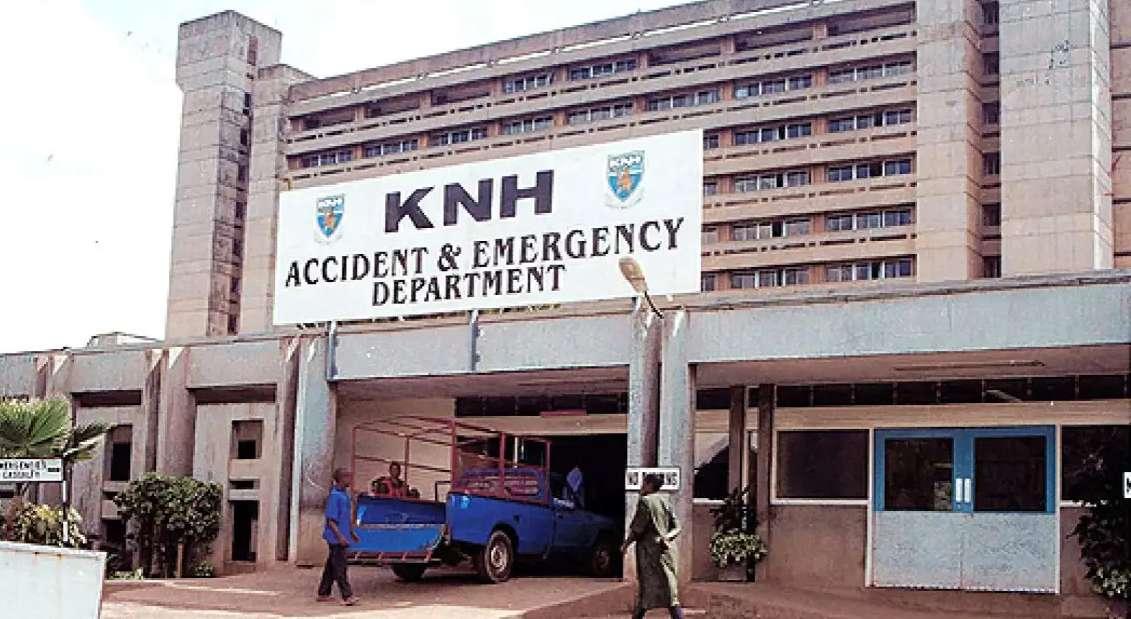


Issue 22 21/10/2022Newsline More than just health
History Check
Editor’s note p.2
History Check p.3-4
Pregnancy and Infant Loss Awareness Week p.5 - 6
KNH nurses conclude nursing process training p.6
Fire Safety and Burns Awareness Week 2022 p 7- 8
Positive mentions from KNH socials p.8
World Hospice and Palliative Care Day: healing hearts and communities p.9
Give me back my smile p.10
Crisis Management: The role of communication in the healthcare service industry p.11 - 12
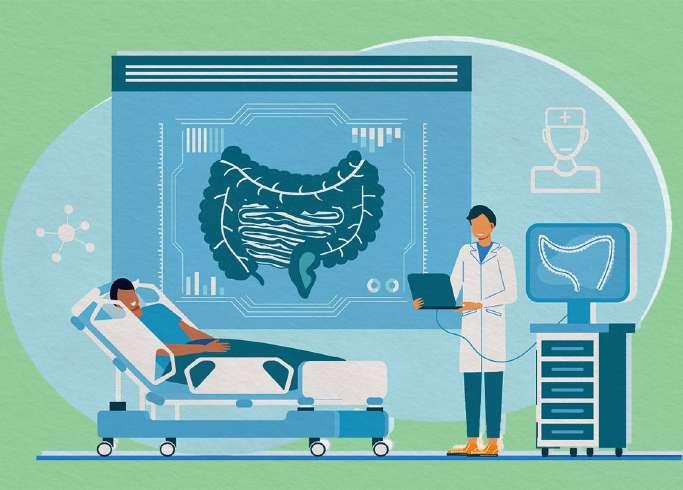
Intern’s Experience p.12
Menopause p.13-14
Hoisting KNH flag high p.14
Our story in Pictures p.15
Love Your Eyes :World Sight Day 2022 p. 16
International Infection Prevention Week p. 17
KNH sharpens staff skills in CBRN management p. 18
Breast Cancer Awareness p. 19
Comic zone p. 20
p. 3
Marketing & Communication Department
Design Concept Team:
Dave Opiyo, Edel Q. Mwende, Yvonne Gichuru & Collins Cheruiyot
Editorial Team:
Dave Opiyo , Edel Q. Mwende, Linnette Leyi, Yvonne Gichuru, Luke Kung’u, Priscah
Angwenyi, Shiphrah Njeri, Shiphrah Njeri & Winfred Gumbo
Stories:
Philip Etyang, Luke Kung’u, Marian Moraa, Shiphrah Njeri, Verah Mugambi, Joan Macharia, Edel Q. Mwende, Petterson
Njogu,Yvonne Gichuru & Faith Gesambi
Design By: Collins Cheruiyot
Photos:
Nicholas Wamalwa, Steve Arwa, Joan
Macharia, Petterson Njogu & Maureen
Mwikali
Tel: +254 20 2726300-9

Ext. 43121 or 43969

Fax: +254 20 272572
Email: caffairs@knh.or.ke knh.caffairs@gmail.com
Dear colleagues,
As the month of October is coming to an end, one, especially us who are affiliated with the health care sector cannot forget that it is the month whereby the whole world marks Breast Cancer Awareness.
Kenyatta National Hospital being the leading institution in provision of cancer care in the country, most members of staff who are the key providers of health care have not been sensitized to fully uptake cancer screening services within the facility. In view of this, the hospital has seen it fit to offer cancer awareness and screening to both the staff and members of the public from Thursday 27th to Friday 28th October, 2022 from 8am to 4pm at the KNH Helipad Grounds. The official launch of the event will be held on Friday, 28th October, 2022 at the same venue from 9am.
With theme for the event being “Build awareness, connect communities and encourage hope”, the services to be offered will include mammography, ultrasound, clinical breast exam, colonoscopy, via villi, Pap smear, colposcopy, Random Blood Sugar (RBS), Fecal Occult Blood Test (FOBT), Human Immunodeficiency Virus (HIV), blood pressure, nutritional services and health education.
With these kinds of tests being offered at one stop location, it is only necessary that we take advantage and make a date to get ourselves checked, shall we?
All the Newslines and Newsletters can be accessed online at: https://bit.ly/3uQGCcI


Ms. Winfred A. Gumbo
Public Relations Officer, Marketing and Communication Kenyatta National Hospital
21/10/2022 ISSUE 22 | Kenyatta National Hospital Newsline We Listen, We Care 2
Editor’s
note
ON THE COVER History Check
Kenyatta National Hospital @CeoKnh @KNH_hospital Kenyatta National Hospital Official Page www.knh.or.ke Find us on Social Media Contents ISSUE 22 To contribute or report on newsworthy items, please contact the Editorial team.
History Check
By Philip Etyang
Globally, hospitals contend with disasters and crises of national importance from time-to-time.
Since inception, Kenyatta National Hospital (KNH) through its various organs such as the Disaster Management Unit at (KNH) and the Accident and Emergency Department have been on the frontline in mitigating the effects of disasters through Disaster Risk Management practices.
The hospital has also been one of the main responders in the unfortunate incidences of disasters over the years.
According to the World Health Organization (WHO), health care facilities can be affected by several disasters such as natural phenomena like earthquakes, hurricanes, landslides, volcanic eruptions and floods. They can also be damaged by anthropogenic (that is man-made) events such as fires, gas leaks or explosions.
The hospital’s capacity in handling mass disasters was put to the test on the 7th of August, 1998 following a terrorist attack in Nairobi.
The twin attacks took place at the United States Embassy in Nairobi grounds, neighboring Ufundi and Co-operative Bank buildings. The second blast took place at the United States Embassy in Dar es Salaam, Tanzania (almost simultaneously), claiming the lives of 213 people in Nairobi and 11 in the Dar es Salaam attack.
Records indicate that over 5,000 people in Nairobi alone were injured in the twin attacks. Tanzanian authorities capped the number of those injured at 85.
KNH Accident and Emergency Department received 1,471 people out of the 5,000 who were injured, with 1,134 being attended to on the day of the bomb blast. 54.5 % (801)
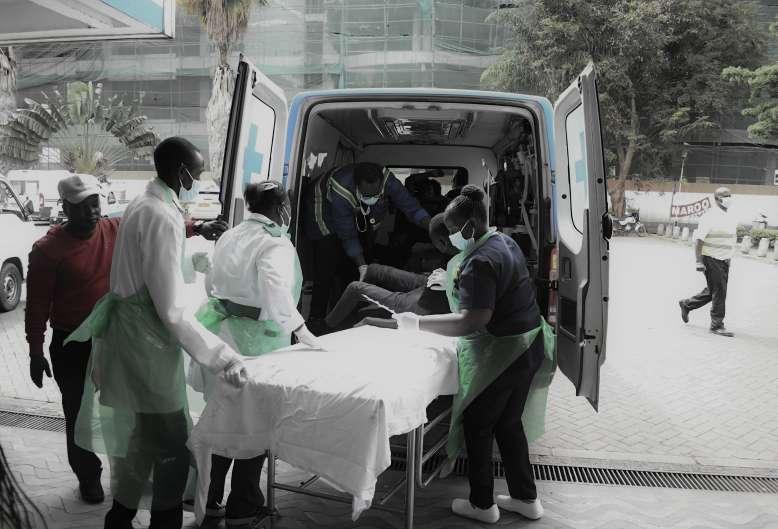
were male, while 45.5 % accounting for 669, were female. This number accounted for 43.92% while the remaining 56% received treatment in different health facilities in Nairobi. KNH therefore, handled majority of the cases, making it the first option for most people when it comes to health care treatment.
71.6 % of this number were between the age of 20 and 40. Hospital records further indicate that 646 of those injured received treatment at KNH’s Accident and Emergency Department within the first 24 hours following the blast. The remaining 825 during the screening and reconstruction period.
The then Deputy Director (Clinical Services) Dr. C.J Omondi commended the KNH medical staff for their efforts at saving life following the blast.
“For the medical staff, the situation was challenging. They had to move fast. They carried victims stained with blood through the crowds past charred and mutilated
bodies. They went past crying victims on the floor. They hurried to identify the most injured,” he said.
On his part, Dr Augustine Muita, the then KNH Director, expressed his gratitude at the various humanitarian assistance offered to the victims of the blast. Donations in form of food, medical and other supplies was received from ordinary people, businessmen and foreign governments as well as many other organizations.
It was a genuine collaborative effort in the service to alleviate human suffering. “Beyond the call of duty was the urge to serve humanity which was shown by all,” he said.
The African Medical News, a health care publication reported in September 1998 that “For the first time Kenyans were grateful that the country has a health facility of KNH’s caliber.”
The National Policy on Disaster Management defines disaster as a serious disruption of the functioning of a community
21/10/2022 ISSUE 22 | Kenyatta National Hospital Newsline We Listen, We Care 3
“For the medical staff, the situation was challenging. They had to move fast. They carried victims stained with blood through the crowds past charred and mutilated bodies. They went past crying victims on the floor. They hurried to identify the most injured,”
Dr. C. J Omondi
PHOTO | NICHOLAS WAMALWA
Medical personnel receiving injured patients at the KNH Accidents & Emergency after a disaster
In times of crisis, KNH’s ER’s response has never wavered, pointing advances in patient care at the hospital
or society causing widespread human, material, economic or environmental loses which exceed the ability of the affected community/society to cope using its own resources. It was therefore, crucial that everyone came together to help alleviate the effects of the terrorist attack.
The policy governs the way in which the National Disaster Management Unit operates as it seeks to meet its mandate of effectively preparing for and responding to emergencies, managing recovery and mitigation efforts in Kenya, in collaboration with stakeholders, KNH’s Disaster Management Unit being one of its stakeholders.
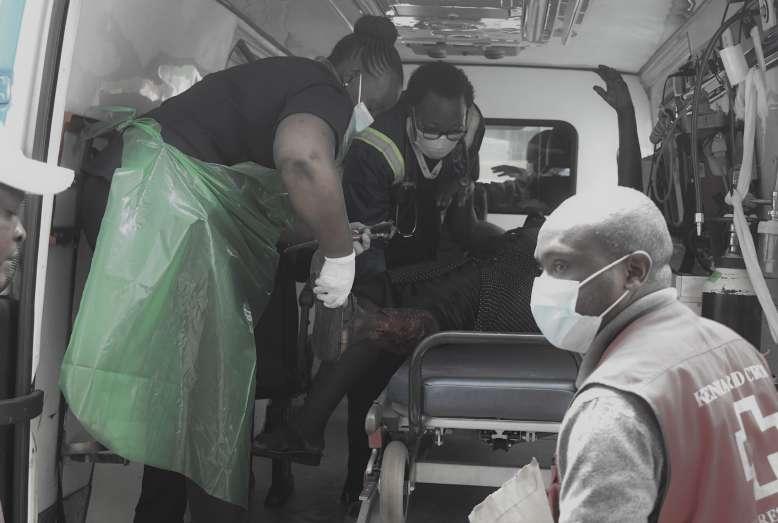
The unit was established through a Presidential Directive in August, 2013 as an effective and competent disaster management unit with an established command structure, budget and Standard Operating Procedures (SOPs) based on best practices.
Since the bomb blast tragedy, the hospital has handled several other major disasters which include the Tsavo-Voi Train tragedy of 24th March 1999 where 31 patients were attended to. The 31st of March 2000, Kericho-Nakuru highway accident involving an Akamba bus and Shaggy buses where 25 patients were treated. The Athi-River Train Fire Tragedy of 20th August 2000 saw KNH attend to 37 patients.
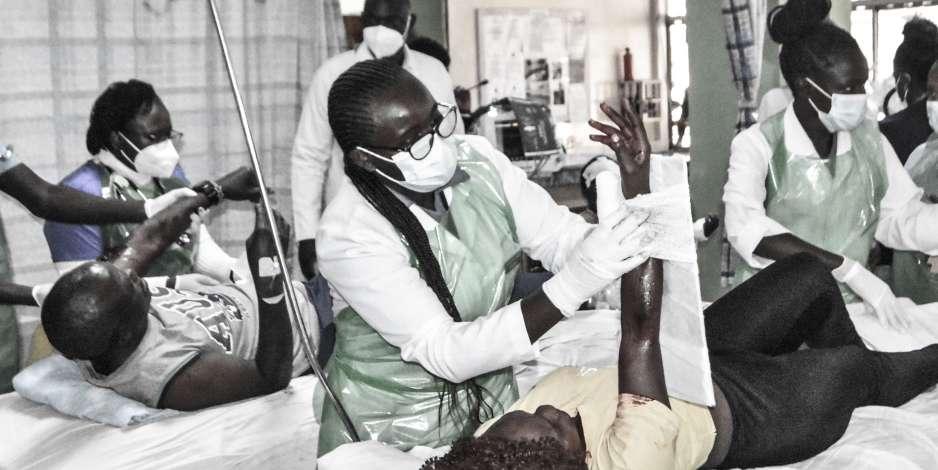
Following the accident, the then
- The African Medical News, September 1998.
KNH Director, Dr H.W. Waweru appreciated the damaging effects of burn wounds that affected most people following the accident.
“This was a disaster like none we have handled before mainly
because burns present a peculiar problem, not only are burn wounds agonizingly painful, they also take long to heal. Even after the critical healing, a survivor’s skin is disfigured by constructures, which require specialized surgery if they are to heal properly,” he said. Other major disasters that KNH has had to deal with include the Alcohol poisoning Tragedy (Kumi Kumi) of 15th November 2000 where 509 patients were treated at its facility. The Kyanguli Secondary School Fire Tragedy of 27th March 2001 is yet another disaster where 15 patients were attended to at KNH.
21/10/2022 ISSUE 22 | Kenyatta National Hospital Newsline We Listen, We Care 4
PHOTO | NICHOLAS WAMALWA
Medical Personnel at KNH Accidents & Emergency attend to criticaly injured patients after a disaster
PHOTO | NICHOLAS WAMALWA
An injured patient is carried out of an Ambulance by Medical personnel after being rushed to KNH
“For the first time Kenyans were grateful that the country has a health facility of KNH’s caliber.”
Pregnancy and Infant Loss Awareness Week
Things you should not tell a grieving parent
By Verah Mugambi
Baby Loss Awareness Week is a chance for people who have lost a baby to come together as a community and find a supportive space to share their experiences. 1000s of people each year experience baby loss in pregnancy, at or soon after birth, or in infancy. However, there is still silence, shame, and discomfort around the topic.
Pregnancy and Infant Loss Awareness Week is observed globally from 9th October to 15th October every year. The day was established to honor, celebrate, and remember babies who have passed away due to miscarriage, stillbirth, neonatal death, and other causes of infant loss.
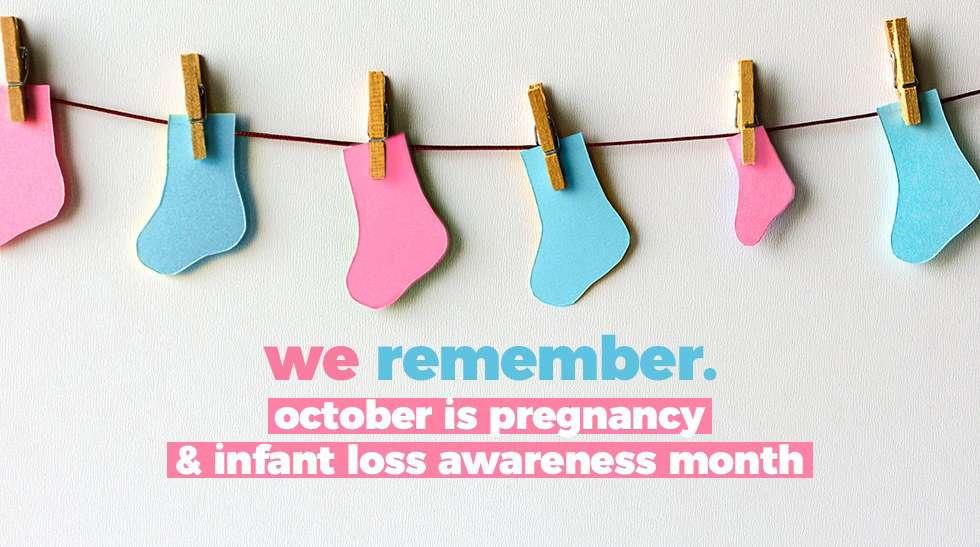
This year Newsline went to KNH’s Labour Ward and talked to Ms. Mwajuma Maulid, a midwife and mental health nurse, and we discussed what KNH does in
cases such as our topic.
“We have different kinds of mothers that come; i.e., mothers who come having perceived less or no fetal movement at all, some come with pregnancy that is threatening…bleeding, others come with everything normal, but during delivery, something happens, and they lose their babies…etc. All these mothers end up grieving because they have lost,” Ms Mwajuma said during the interview.
“In such cases, we walk with the parents, counsel them as nurses and sometimes also involve the hospital counsellors. We try as much as possible to make them comfortable and guide them until they are discharged. We also bring on board the chaplain to come and pray with the mother or the family members.
“Some parents request to see their babies before they are
taken to the mortuary and hold them a bit. At this point, we also invite the father and any family member around if they want to see the baby since they have lost the baby too,” Nurse Mwajuma continued.
“As a hospital, we are planning to have a separate room/ ward for them because it can be traumatizing to sit there with babies crying and others breastfeeding while you are just there with no baby. So, from that point, they can support each other and take time to grieve before being discharged.
“Society tends to focus on the woman so much and forget that the man has also lost. So we try as much as possible to talk to the father, counsel and listen to him. Sometimes the best thing you can do as a friend or family member is just to sit and listen, don’t rationalize, don’t give nice quotes, be there and keep quiet”,
21/10/2022 ISSUE 22 | Kenyatta National Hospital Newsline We Listen, We Care 5
PHOTO | STOCK A modern secretary at work
Nurse Mwajuma concluded. Things you shouldn’t tell a grieving parent
I know how you feel; to say to someone that you know how they feel is for one thing, probably not true. It also seems to rob the person of their right to how they should feel. Can anyone really understand what another person is feeling like? Probably not so it’s best not to say it.
You’ll get over it; this seems a bit cold because we offer unsolicited advice. To tell someone they’ll get over it is somewhat of an insult to them. Give them time to grieve. Grieving is a natural thing to go through. Never tell someone enduring a great loss that they’ll get over it.
It would help if you were strong; to tell someone experiencing grief to keep strong is asking someone to do something that they can’t even imagine doing at the time. Let them grieve and cry…the healing process takes a lot of time.
All Things Work together for the
Good; people quote Romans 8:28 which says “And we know that for those who love God all things work together for good, for those who are called according to his purpose.” That verse is true but it doesn’t help the person who is grieving. It doesn’t seem to fit the situation, and even if you think it does, this Bible verse isn’t much help for someone who’s lost a loved one. The death of a child can never work out for any good. Don’t cry; if we tell someone not to cry, we are basically telling them that they shouldn’t be crying when crying is part of the grieving and healing process. Crying helps one deal with grief. To try and tell someone not to cry when they just lost a child is never a good idea. Crying will actually help them deal with their loss.
Time Heals All Wounds; Time may help in the long term but it does nothing to help during the time when someone has just suffered a great loss.

Other things parents shared with Newsline is; You’ll get over it, try to be strong, God never gives
you more than you can handle, God must have needed another angel, he or she’s in a much better place, or just have faith. Sometimes not saying anything is best. Just be there for them. Sit quietly and grieve with them. All we might be able to say is “I am so sorry.” When words cannot express our sorrow for someone else, then why use them?
KNH nurses conclude nursing process training
By Linnette Leyi
The Division of Nursing Services through the Nursing Standards and Research department conducted the Nursing Process training from 3rd to 14th October 2022 for the first cohort of nursing staff.
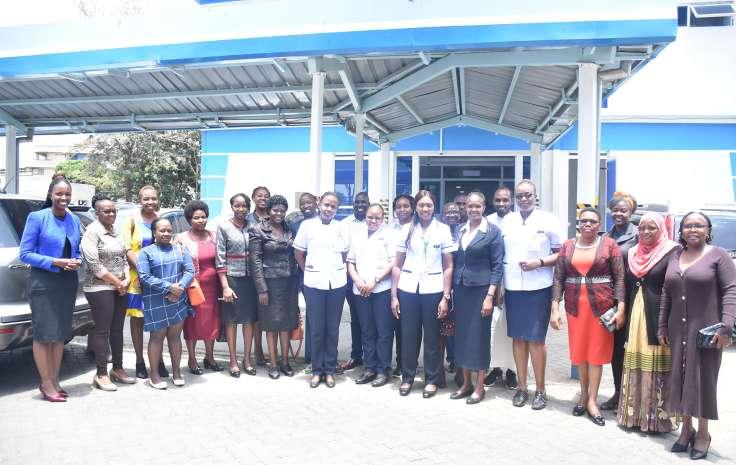
The participants were drawn from Pediatrics, Accident and Emergency and Mama Margaret Uhuru Children Hospital-KNH Annex, and Specialized Surgery.
The two-weeks training will help build capacity with the aims to reduce child mortality rate, reduce average length of hospital stay, increase customer satisfaction and optimize patient experience.
21/10/2022 ISSUE 22 | Kenyatta National Hospital Newsline We Listen, We Care 6
PHOTO | STOCK Baby socks in rememberance of child loss
Brief
PHOTO | LINNETTE LEYI
The first cohort of nurses that completed the Nursing Process training alongside their trainers after the closing ceremony
Fire Safety and Burns Awareness Week 2022
By Joan Macharia & Philip Etyang
Safety starts with you and me and when it comes to fire, prevention is key to everyone to prevent burns, hence the saying, ‘Prevention is better than cure’.
KNH, Burns Society of Kenya and other affiliates launched the 2022 Fire safety and Burns awareness week an annual activity aimed at sensitizing the public on fire safety and prevention of burn injuries and enhance management through campaigns.

This year’s awareness week was celebrated from 11th October to 14th October 2022 with a theme ‘Moto hausubiri, jipange mapema’. ‘Fire does not wait plan your response’. HoD-Obstetrics & Gynaecology Dr. Maureen Owiti representing the CEO noted that the hospital does the best to give the care required for burns patients.
Over the week, the team created awareness on fires and burns safety in Mlango Kubwa, Mathare area, Kiamaiko and Huruma with the message on fire prevention. Among the many areas of sensitization included First Aid for Burns as follows;
a) Stop the burning process
b) Stop what you are doing
c) Drop to the ground
d) Roll around and extinguish the flames
e) Cool the burn with clean, cold running water
f) Call for emergency assistance or visit the nearest medical facility for further medical assistant.
The team also taught about open fire safety and encouraged members of the public to avoid open flames in buildings, inflammable fluids also to be kept away from open fires. Prevention of open fires at home includes:
a) Turn off stove before refilling kerosene
b) Beware of using faulty stoves or gas cookers
c) When using firewood or a jiko, cook food in a well-ventilated room or outside
d) Store matches and flammable
liquids away from the reach
e) Do not leave candles, heaters or kerosene lamps unattended
f) Avoid open flames when drunk
The public was also taught how to extinguish small fires at home using a fire blanket or soil.
It was also a great opportunity to demystify the home remedies that people do. This is because these can cause infection and worsen the burn. Rinse the burn with clean, room temperature water, cover with a clean cloth and seek medical advice. Examples of home remedies to avoid include transformer or engine oil, toothpaste, herbs and eggs.
Another area of sensitization that was done include 5 Easy steps to avoid Electrical Burns:
a) Avoid illegal connections
b) Do not touch naked electrical wires
c) Avoid water spillage near electrical sockets
d) Turn off power mains before doing any electrical work
e) Inform Kenya power of any low hanging electrical wires
Culmination of week’s activity was done with a procession from Nairobi CBD to KNH to sensitize the public on
fire safety and burns prevention.
Dr. Wabwire, HoU- Burns unit on behalf of the KNH CEO noted that KNH being the only public healthcare with specialized burns unit in Kenya handles many patients per year. Burns arising from fire accidents, gas and chemical are common. Most residential fires have been ignited by children when left alone in the house while others due to electricity faults or illegal connections especially in resource constraints areas by unqualified electricians.
Treatment of burns injuries is expensive because of the special care and management required. It costs the government approximately one (1) million shillings to treat one burn patient for a month. It is therefore a responsibility of each one of us to take the necessary measures to prevent ourselves from fires that would cause the Injuries.
For many who survive burns they live with stigma due to resultant scars and associated post-burn complications. Many have lost their sources of livelihood since they are now incapacitated.
The Newsline team, with the help of Dr. Wabwire, traced a burns victim who successfully received treatment at the Burns Unit, at KNH to highlight
21/10/2022 ISSUE 22 | Kenyatta National Hospital Newsline We Listen, We Care 7
PHOTO |NICHOLAS WAMALWA
Walk from CBD to KNH for the burns awareness.
his experience following the accident.
“I came to realize that a high voltage electrocution accident is not an accident like any other. The Burns Unit is like the ICU of burn victims and I was there for 10 days, and when I became stable, I was moved to the main ward where I stayed for another 101 days. In total I underwent a total of 10 surgeries to correct the effects of the accident,” Mr. Fred Mwireri said.
He further said that the plastic surgeons who treated him at KNH went the extra mile to ensure that the accident injuries that he sustained, were treated effectively through research.
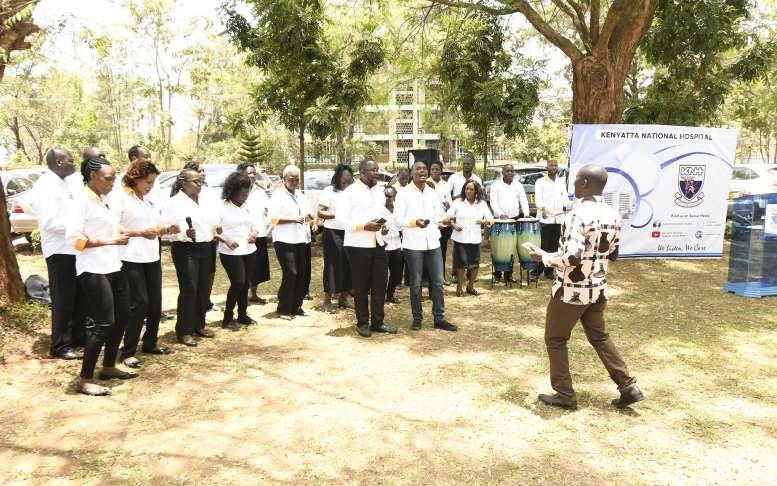
“I was attended to by two plastic surgeons; Dr. Kahoro and Dr. Ngole who went the extra step to do further research and ensure that my left arm was not amputated because of the severity of the accident,” Mwireri said.
Kenyatta National hospital being the apex of the referral system in
“I was attended to by two plastic surgeons; Dr. Kahoro and Dr. Ngole who went the extra step to do further research and ensure that my left arm was not amputated because of the severity of the accident,”
Mr. Mwireri
Kenya is taking a leading role in the management of burns and burnsrelated complication. The hospital in collaboration with the government of Kenya and key partners is finalizing the establishment of a state of art Burns and Pediatric Emergency Centre right opposite KNH Accident and Emergency. This is a demonstration of the government’s commitment to specialized and quality health care management of burns in Kenya and the region.
Positive mentions from KNH socials
 By Luke Kung’u
By Luke Kung’u
Faith Tirop
KNH is the best
Fri Kii
Clinic 18, ward 1B doctors and nurses nyinyi ni shujaa wangu nawarank sana.
Ester Mueni
Happy Mashujaa Day to doctors, nurses and other staff members who attended me in ward 9D. May God bless the work of your hands and your families be blessed. I appreciate and respect you.
Lucy Ndereba Nyaga
Happy Mashujaa Day to all health workers especially staff at Accident

and Emergency department for your selfless service to this great nation. Keep doing your best and may the blessings of God follow you always.
Wambo Moreen
Happy Mashujaa Day Dr. Stanley Ngari, Dr. Ngigi (renal) and Dr. Martin Murage.
Magdaline Shera Karera
Happy Mashujaa day to the thousands of lives you serve every day.
Mary Makau
Happy Mashujaa Day Eye department nyinyi ni my shujaa. My mom could not see with both eyes, she has really improved- still ongoing treatment. God bless you.
21/10/2022 ISSUE 22 | Kenyatta National Hospital Newsline We Listen, We Care 8
PHOTO |NICHOLAS WAMALWA KNH choir entertaining guests
PHOTO | JOAN MACHARIA Sensitization to the community on how to use fire blanket to put out fire at home..
World Hospice and Palliative Care Day: healing hearts and communities
By Marian Moraa
The Pain and Palliative Care Unit led by Dr. Esther Nafula held the World Hospice & Palliative Care Day celebrations 2022 at the Kenyatta National Hospital (KNH) administration lawn under the theme: Healing Hearts & Communities: Improving care for Multi-Drug Resistance Tuberculosis (MDR TB) patients.
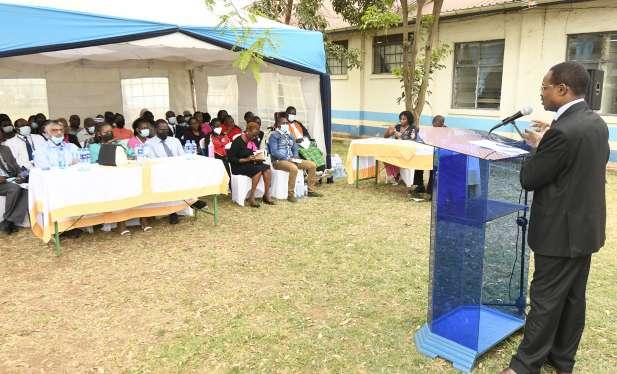
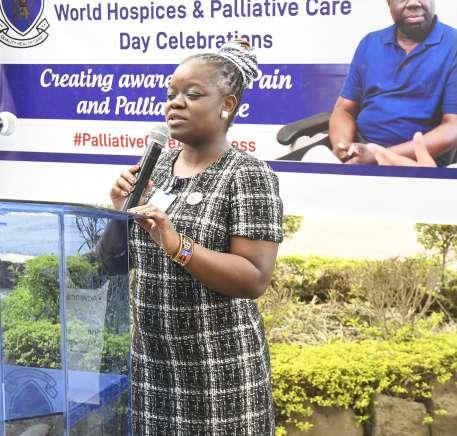
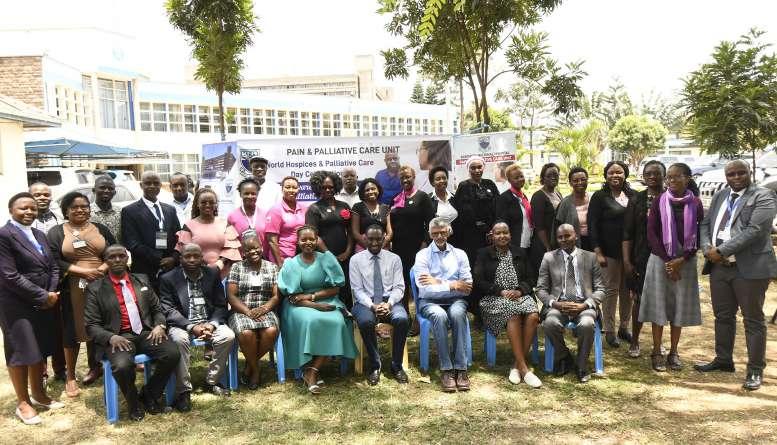
The event attracted members from the Ministry of Health (MOH), Nairobi Hospice, Kenya Medics Association, Stop TB Partnership Kenya and KNH Palliative Care beneficiaries.
Palliative care plays a key role in improving the quality of life for people affected by serious health problems. Those that have lifelimiting illnesses have the right to be cared for in the way that best suits their needs.
Speaking at the event, Dr. J. O. Atina, Head of Unit, Respiratory Infectious Diseases (RIDU) who said pain and palliative care is one of the key multidisciplinary teams that play a huge role in the care and treatment process of MDR TB.
Dr. Nafula emphasized on KNH being the champions for compassionate patients. “We will not shy away from supporting patients with life-threatening and life-limiting illnesses,” she said.
Mrs. Evaline Kibuchi- National Coordinator, Stop TB Partnership Kenya commended KNH efforts for having one of the main DRTB isolation wards. “The wards need to be revamped to create a more homely environment for the patients as they stay here for long periods. Some up to six months” she said.
Representing MOH, Ms. Esther Mueni applauded KNH for being at the forefront in the treatment of MDR TB referral patients not only in the country but also across the borders.
Kenya Medics Chief Executive Officer Dr. Brenda Obondo urged everyone to join hands in the care and support of palliative care
patients. “We all have an active role in enhancing the quality of life,” she said.
A grateful Mr. Ibrahim Theuri spoke during the event stating,”Nikiwa isolation ward at KNH kwa zaidi ya mwaka mmoja, sikukosa kitu kwa matibabu.
Walinihudumia kama dada na ndugu zangu. Nashukuru Palliative Care team sana”, (While at KNH for more than a year, I never missed any treatment process. The staff handled me like my brothers and sisters would. Thank you team KNH Palliative care!)’’.
The event was culminated with a cheerful cake cutting session by the Pain and Palliative Care team and invited guests.
21/10/2022 ISSUE 22 | Kenyatta National Hospital Newsline We Listen, We Care 9
PHOTO | NICHOLAS WAMALWA
Dr. Esther NafulaHead of Unit Pain and Palliative CareKNH adresses the audience during the event
PHOTO |NICHOLAS WAMALWA KNH team and distinguished guests take a group photo during the celebration of the World Hospices & Palliative Care Day in Kenyatta National Hospital
PHOTO | NICHOLAS WAMALWA Dr. J. O. Atina, Head of Unit, Respiratory Infectious Diseases (RIDU) gives his speech during the event
Give me back my smile
KNH Dental Unit goes the extra mile
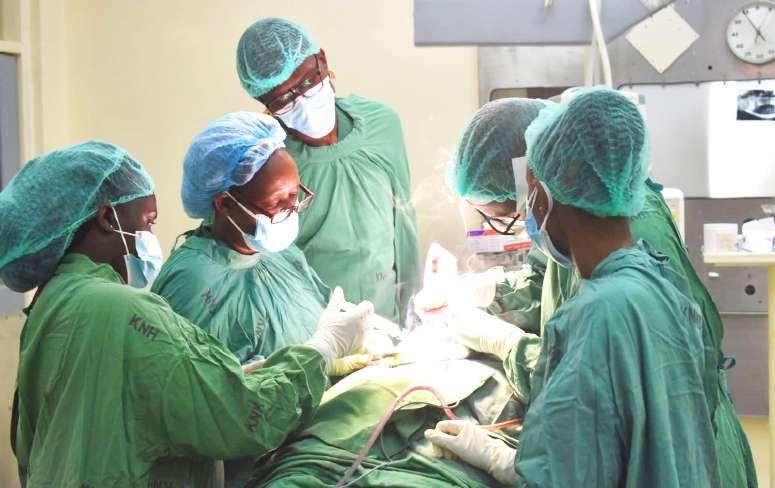 By Cynthia Cherono
By Cynthia Cherono
KNH Dental Unit aims to provide the very best in dental health care services. Our highly specialized team of dentists, offer a full range of dental treatment using the latest technologies. These professionals receive continuous skills training from international and resident experts to ensure provision world class patient centered services. With state-of-the-art dental equipment, up-to-date techniques and modern materials, we are the dental center of choice in East and Central African region. KNH has private and general clinics and is continuously expanding its services. The department operates scheduled appointment-based clinics and also handles emergencies for critically ill patients. Welcome to KNH Dental Clinics, where we go the extra mile to make you smile!
The Dental department, offers comprehensive services such as Aesthetic Dentistry, Implantology, Oral Surgery, Pediatric Dentistry, Periodontics Prosthetics (crowns, bridges & dentures) and Restorative Dentistry. Dental health is a clinical specialty often ignored world over but has a lot of complications and it cuts across all ages, from newborn to adults. Speaking to KNH Newsline, Dr. Andeline Vilembwa head of unit and consultant Oral/ maxillofacial surgery, medicine and oral pathologist Dentistry, observes that “a lot happens that many people don’t know but we endeavor to serve patients with diligence and utmost care because our primary mandate is to provide health-care services to all patients”.
There are sub-sections dealing with different aspects and without one the department is not able to function effectively.
Oral/maxillofacial surgery/ oral medicine/oral pathology-Oral & Maxillofacial (OMF) Surgeons specialize in the diagnosis and treatment of diseases affecting the mouth, jaws, face and neck. It requires dual qualification in medicine and dentistry, and is often seen as the bridge between medicine and dentistry, treating conditions
that require expertise from both backgrounds.
Pediatric dentistry-This specializes in children 13years and below. They have the experience and qualifications to care for all pediatrics dental problems throughout the various stages of childhood including; filling, extraction, treating infections, supervise dentition and teach on oral hygiene.
Exodontia - It is the removal of a tooth from its socket in the alveolar bone with the help of anesthesia. It is a challenging procedure in itself as the dental surgeon has to work in an oral cavity.
Periodontal gum diseasePeriodontal disease affects the tissues that both surround and support the tooth. It is characterized by bleeding or swollen gums (gingivitis), pain and sometimes bad breath. In severe disease, the gum can come off from the tooth and supporting bone, causing teeth to become loose and sometimes fall out.
Orthodontics- Diagnoses, prevents, manages, and corrects mal-positioned teeth and jaws, closing wide gaps between the teeth, improving speech or chewing ability, boosting the long-term health of gums and teeth, preventing longterm excessive wear or trauma of the teeth and misaligned bite patterns.
Prosthodontics- Deals with treating and handling dental and facial problems involving restoration and replacement of missing tooth and jaw structures. Prosthodontists are highly trained in cosmetics, dental implants, crowns, bridges, dentures, and temporomandibular disorders (TMJ/TMD). KNH recently did naso-alveolan moulding and surgical feeding plate for a child who was born with cleft before surgery.
Dental lab-A variety of products are manufactured or customized here as prescribed by a licensed dentist for provision of oral health care. They include crowns, bridges, dentures, prosthetic devices and therapeutic devices among others.
Restoration and conservative dentistry- This involves procedures for placing dental implants, fillings, crowns, and dentures and conservative restorative dentistry that keeps your teeth working well and looking good.
Dr. Vilembwa observes that emergencies are admitted through outpatient department to specialized ward (5A) for those requiring surgery and post-operative care, though bed space is still a challenge. She concludes by noting that the burden of dental problems is still quite high yet it is not given the attention it requires.
21/10/2022 ISSUE 22 | Kenyatta National Hospital Newsline We Listen, We Care 10
PHOTO | STEVE ARWA
Dr. Kilembwa the lead surgeon performing a surgery to refill the patients Clavicle bone before the patient receives prostrate teeth
Crisis Management: The role of communication in the healthcare service industry
By: Yvonne Gichuru
The bustling hospital work environment is already hectic enough and puts everyone who is working there (doctors, nurses and nonmedical staff) under a lot of risks and pressure. Giving the appropriate treatment and care to patients so they continue to be well are just some of the responsibilities that come with working inside a hospital.
COMMUNICATION TO CONSIDER IN A HEALTH CARE SETTING
There are plenty of forms of communication to consider in a health care setting, take all of your systems into account and make a plan for how you’ll use them. Whatever your preferred method, just make sure it’s encrypted if it involves patient health information.
However, there are certain events that can bring an unprecedented crisis inside a hospital and make the already difficult work environment inside the hospital much more complex. For instance, when the COVID-19 pandemic first hit, hospital staff went from rarely managing an unfolding crisis to doing it every single day and this resulted in bed, equipment, staff, and overall capacity shortages.
Crisis management therefore can determine how much an organization suffers from an adverse event. The well-being of patients and family members should be a top priority along with transparency and good communication are key to limiting the effects of an incident.
Crisis Communications Preparation: Having a proper crisis communication plan is a necessary step in a hospital’s crisis management plan in order to keep them operational even when the crisis is at its worst point.
Preparations should involve identifying potential variables in each
incident which impacts the method and content of crisis communications, key stakeholders to participate in the communications response and clearly defining roles for each participant.

This can be implemented by:
1. Establishing a crisis communications team to lead creation and implementation of strategy and messaging.
2. Designating an organization spokesperson by determining who the primary contact person is and can say what and to whom. The spokesperson may be different depending on the nature of the crisis. He or she should be available, knowledgeable in the subject matter relative to the crisis, articulate, comfortable answering difficult questions and able to remain calm under pressure. Media training for the spokesperson is essential as he/ she should also be able to establish the most important messages relative to the crisis and ensure that they are represented well in all public statements and
21/10/2022 ISSUE 22 | Kenyatta National Hospital Newsline We Listen, We Care 11
From the communication desk
PHOTO |STOCK
communication tactics.
3. Establishment of a phone tree or chain of command for communication by knowing what to do in the first five minutes: Who to call and in what order they should be contacted. Patient care should be prioritized, securing the area and/or securing potential evidence.
4. Media considerations such as proactively engaging members of the news media and introduce them to your organization before a crisis is necessary.
5. Understanding keys to effective communication through:
» Building trust with your audiences: providing facts, being honest, following up when you agree to do so, even if additional information is not available and not speculating or exaggerating.
» Knowing your audiences and what is important to them. Understand who should receive the information and adjust the messages and methods of delivery based on the needs of each audience.
» Developing effective internal communication channels (board of directors, employees, providers, volunteers, etc.)
» Determining what means of communication will work best in your organization (social media, phones, intercom, radio, email, etc.) It is important to note that some methods of communication may not be available depending on the crisis at hand. An alternate communication method is paramount in the event the primary method is unavailable.
During the Crisis
1. Bring together the crisis communications team and establish process, procedures and guiding principles. Thereafter, determine a communication strategy (proactive vs. reactive, news briefing vs. statement, etc.)
2. Identify spokesperson and identify information authorities; confirm the facts
3. Determine content of initial key messages and deliver messages through preestablished communication channels (social media, web, email, contacting key media etc.) to critical internal and external audiences, with internal audiences notified first if at all possible.
i) Early follow-up tasks for crisis communications team include:
» Refining messaging as more information becomes available and confirmed
» Preparing initial media statement and/ or media briefing: tailor information for audiences and for multimedia platforms
» Activating a media center (if briefings will occur)
» Identifying key audiences (internal and external)
4. Determine staffing for immediate response and ongoing response
ii) Ongoing follow-up tasks:
» Update key internal stakeholders
» Hold news briefings/conferences, as needed and appropriate
5. Monitor mainstream media/social media channels; clarify or correct inaccurate information, as appropriate
» Identify second tier of stakeholders (volunteers, providers, neighbors, etc.) who need to be informed after immediate crisis has passed
iii) When implementing the plan:
» Explain why you are unable to share certain details
» Maintain focus on short and long-term goals
» Determine what patient information can be released, given state and federal privacy restrictions
» Stay calm and professional
Post-Crisis Evaluation
This where to identify what lessons were learned and what could have been done better. Where the team excelled, what type of training could have improved the response and identify any actions that prevented the problem from becoming worse and may help prevent a recurrence. Developing a remediation plan to address any reputation damage will also be useful.
In conclusion, when a crisis strikes, communicating becomes more critical. There is a need to be able to relay information quickly, clearly, and efficiently.
There are plenty of forms of communication to consider in a health care setting, take all of your systems into account and make a plan for how you’ll use them. Whatever your preferred method, just make sure it’s encrypted if it involves patient health information.
The bottom line is that you need to establish how you are going to communicate and what needs to be communicated to your staff and the public. Once you can manage the communication aspect, the rest will come along much smoother.
The intern’s experience
By Faith Gesambi
Meet: Nicole Jean Wangu

Department: Administration
Tasks: sorting pay slips, officiating documents at Central Registry, dispatching records, Receiving letters
Three things you’ve learnt about KNH:
• It’s the biggest and oldest hospital in Kenya
• It’s the chief referral hospital for the ministry of health
• It offers teaching services to students of UON and KMTC and also offer field attachment to students from other universities.
How has the internship added value to you?
I have learnt the importance of teamwork, commitment, punctuality and discipline.
Most memorable moment at KNH
Everyone was so receptive on the first day of my internship
Your career plan after graduating I wish to pursue a Masters in health system management.
21/10/2022 ISSUE 22 | Kenyatta National Hospital Newsline We Listen, We Care 12
Menopause
A conversation that every woman should have as they age
By Verah Mugambi
Menopause is the natural cessation, or stopping of a woman’s menstrual cycle, and marks the end of fertility. Most women experience menopause by age 45, but pelvic or ovarian damage may cause sudden menopause earlier in life.

Menopause occurs when a woman hasn’t menstruated in 12 consecutive months and can no longer become pregnant naturally. It usually begins between the ages of 45 and 55 but can develop before or after this age range.
Newsline talked to KNH’s Obs/ Gynaecologist Dr. Ikol Allan, who expounded on this topic. “Menopause is a natural process that occurs as the ovaries age and produces reproductive hormones. Menopause is something that all women within their lifetime will have to experience as long as there are alive.

“IT occurs due to ovaries stopping to function because of age. As a woman is born, she is born with a particular number of eggs, and everything month, that egg undergoes maturity resulting in the menstrual cycle. In simple terms, ovulation is equal to menstrual flow…so when you stop ovulating, your menstrual flow stops. When that happens, especially if a woman is above 45 years, now that’s what we call menopause” Dr. Ikol started the interview by defining menopause in depth.
The body begins to undergo several changes in response to lower levels of estrogen (also known as the woman’s hormone), progesterone testosterone, and Follicle-Stimulating Hormone (FSH).
“Most women first notice the frequency of their period becoming less consistent as the flow becomes heavier and longer. This usually occurs at some point in the mid-to-late 40s. By the age of 55, most women have undergone menopause”, Dr. Ikol continued.
According to Dr. Ikol, menopause is classified into two phases; Perimenopause and menopause. “During perimenopause, menstrual periods become irregular. Your periods
may be late, or you may completely skip one or more periods. Menstrual flow may also become heavier or lighter. Menopause is defined as a lack of menstruation for one full year”.
“When patients’ periods start skipping, and they start having symptoms of menopause, they’re also losing bone at that time since you stop absorbing calcium,” said Dr. Ikol. “So, they need regular screenings for bone density. They need to make sure they’re getting enough calcium and vitamin D”.
What are the symptoms of menopause?
Dr. Ikol: Every woman’s menopause experience is unique. Symptoms are usually more severe when menopause occurs suddenly or over a shorter period of time. Changes in your menstrual period are often the first sign of perimenopause. Perimenopause and menopause can also affect your body in other ways, which may cause a variety of symptoms.
These may include: less frequent menstruation, heavier or lighter periods than you usually experience, vasomotor symptoms (VMS),
including hot flashes, night sweats, and flushing, insomnia, vaginal dryness, weight gain,
21/10/2022 ISSUE 22 | Kenyatta National Hospital Newsline We Listen, We Care 13
PHOTO | WOMANLOG
PHOTO | COURTESY Dr. Ikol Allan - KNH’s Obs/ Gynaecologist
reduced libido, or sex drive and recurring urinary tract infections (UTIs).
Ms. Jennifer (not her real name), a nurse at KNH’s clinic 18, told the Newsline of her first-time experience during menopause. “No one told me anything about menopause, and I had no idea what was happening to me. No one wants to talk about this, how hard it is, what shame and confusion it can instill.
“I thought menopause is for old women, so the fact that it occurred early for me was so confusing. Those who are experiencing or are going to experience menopause shouldn’t have to dread it, be confused by it, or be unprepared for it.”
“Menopause is hard, but it isn’t hopeless. And the more we talk about it, and the more we innovate for it, the easier this transition will be for
women who come to us. My greatest hope is that we offer awareness and education to people surrounding this very natural life transition, in order to make the best choices for themselves”, Ms. Jennifer explained.
The transition to menopause can take many years. However, it doesn’t necessarily kill your sex life, sentence you to a life of night sweats and no sleep, or make you old. It’s time to put these misconceptions to rest.
“Menopause doesn’t always require treatment. But if symptoms are interfering with your life, you’re not obligated to grin and bear it. Discuss your symptoms with your doctor and ask about treatment options that can help improve your quality of life.”
“You may benefit from treatment, such as hormone therapy if your symptoms are severe or affect your quality of life. Generally, menopause
symptoms can be managed or reduced using natural remedies and lifestyle adjustments” Dr. Ikol concluded.
Speaking with your doctor about menopause can help you learn what to expect, manage symptoms, and stay healthy as you age. Let them know if you develop changes in your menstrual cycle or other symptoms of menopause. They can help determine the cause of your symptoms and recommend treatment.
It’s important to find a healthcare professional who’s not only qualified to treat menopause-related issues but also easy to talk with. They should listen carefully to your concerns and encourage you to ask questions. Finding the right doctor can help you get the information and support you need to manage menopause and life beyond.
Hoisting KNH flag high
By Mr. Jonathan Kibathi
Kenyatta National Hospital flag was briefly hoisted 19,341 ft above mean sea level (AMSL) at Uhuru Peak, Mt. Kilimanjaro on 9th October 2022, 4.20pm. The monumental moment was felt by an elated Catering Officer (KPCC) Mr. Jonathan Kibathi who was on a three-day personal expedition at Mt. Kilimanjaro in Tanzania.
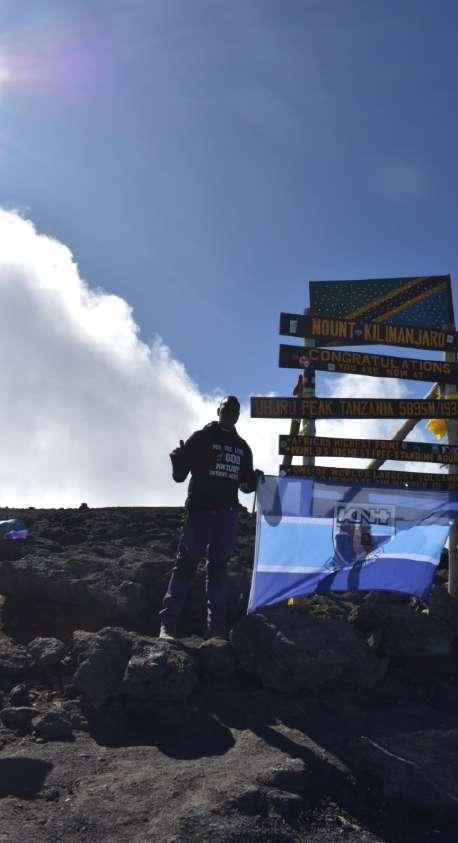
Thank you, Mr. Kibathi, for taking the initiative.

21/10/2022 ISSUE 22 | Kenyatta National Hospital Newsline We Listen, We Care 14
PHOTO | COURTESY
Mr. Jonathan KibathiCatering Officer (KPCC)
PHOTO | COURTESY
Mr. Jonathan Kibathi - Catering Officer (KPCC) pitch a flag after succesfuly climbing to the peak of Mount Kilimanjaro
Our story in pictures
KNH Hands over the new oxygen generating plant to Biomax Africa
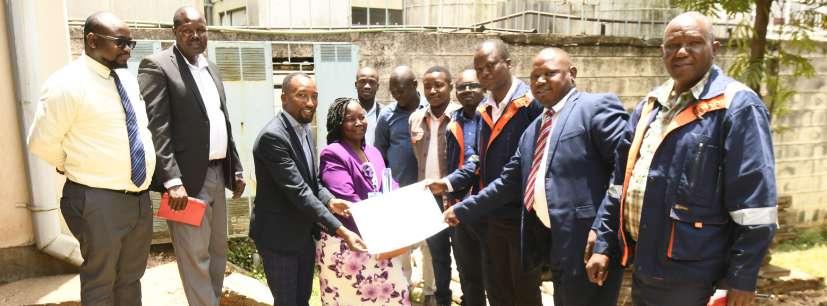
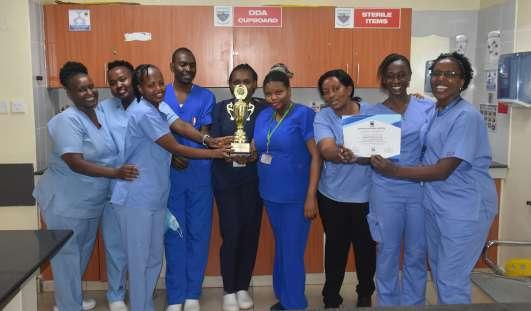
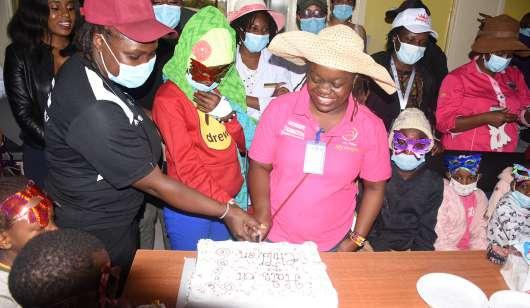
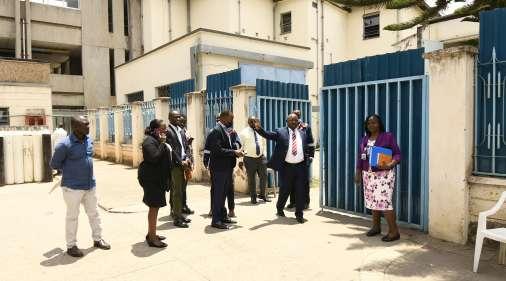

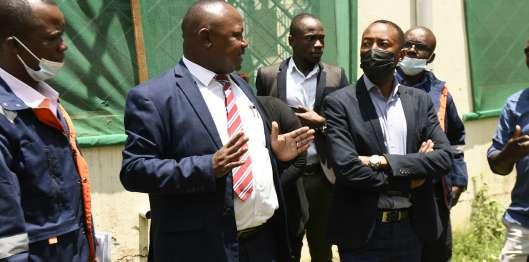
Limited
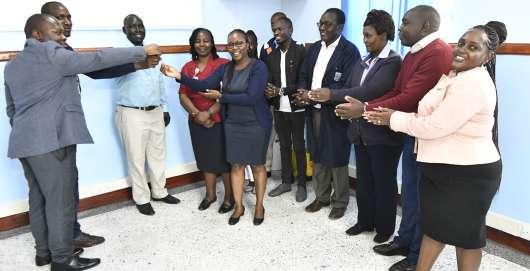
21/10/2022 ISSUE 22 | Kenyatta National Hospital Newsline We Listen, We Care 15
PHOTO | NICHOLAS WAMALWA
Hand over ceremony of the new E ‘Learning centre from CIHEB KENYA to KNH CCC
PHOTO | NICHOLAS WAMALWA
PHOTO | PETTERSON NJOGU
KPPC 9C Critical Care Unit (CCU) Ward celebrates for winning this year’s IPC trophy after being named the best performing Unit in Hand Hygine Adherence in line with IPC procedures
PHOTO | STEVE ARWA KNH Palliative team lead by Head of Department Dr. Esther Nafula and the Representatives from the Faraja Leukemia Foundation paid a visit to Ward 3D & 1E where they handed out gifts to patients.
Love Your Eyes World Sight Day 2022
 By Luke Kung’u
By Luke Kung’u
Eyes, as the old adage goes, are the windows to the soul. The question remains; how well do we take care of our eyes? The fact that we are in an information technology savvy period that has its enormous benefits, does not make it foolproof to have no countereffects. We have seen an increase in the use of light emitting gadgets such as mobile phones and computers that have revolutionized the work place and made work easily accessible and quite enjoyable. However, this also has a down tone owing to the long hours spent gazing at the light emitting gadgets; even children as young as one year throw tantrums whenever they are taken away from them. This needs to be addressed promptly.
In realization of the predicaments that bedevil such technological advancement, the ophthalmology department hosted this year’s world sight day on 13th October 2022. This year`s theme was ‘Love Your Eyes” to highlight and raise awareness on the importance of good eye care. The event kicked off with a walk-through Hospital road, Ngong road, Raila Odinga road, Upperhill links road and back to KNH Information Center grounds.
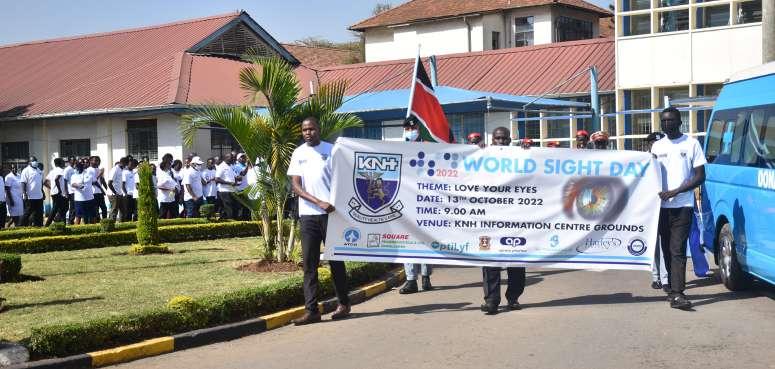
“Our primary mandate is to provide specialized health care services to patients and it is in this view that the KNH Eye clinic is calling on each and every one of us to help show how important it is to ‘love our eyes’. We are pledging to help reach many for eye sight test goal, to ask people to save their eyes through wearing glasses, and reminding everyone to take care of their eyes,” said Head of Obstetrics and Gynaecology Dr. Maureen Owiti who presided over the event on behalf of KNH management.
The ophthalmology department offers the following services: general outpatient eye clinic, oculoplastic clinic and surgery, pediatric eye clinic and squint surgery, vitreo-retinal clinic and surgery, Anterior segment clinic and surgery, Glaucoma clinic and surgery, Retinopathy of prematurity screening, laser treatment, emergency eye treatment
services, specialized diagnostic service, education and research, specialized nursing care as well as outreach eye care services.
The ophthalmology department recommends the following measures to ensure eye care:
• Clean face and eye discharge always to keep flies away, they carry germs. The discharge is food for the flies
• Eat adequate diet enriched with vegetable and fruits
• Protect eyes from sharp objects such as pins, pencils, wood and particles
• Take newborn babies with any type of discharge to a health worker or eye specialist immediately for treatment
• Complete children immunization schedule promptly
• Visit a health worker in case of any eye problem such as abnormal eye color, continuous eye cry (tearing) and poor sight
• Visit an eye specialist if unable to see clearly far or near and wear your glasses as prescribed
• Always use eye protective materials while undertaking workshops activities e.g welding
• Visit an eye specialist regularly for your eye check- up and review
• Do not medicate yourself for any eye problem or infections
• Do not use traditional eye medicine
• Do not look directly and for a long period at excessive light and bright lights
• Do not rub eyes unnecessarily to avoid infection
• Do not undertake some workshop activities such as metal grinding without wearing eye protective gears
Clients can reach out to Ophthalmology department on EXT 43519.
21/10/2022 ISSUE 22 | Kenyatta National Hospital Newsline We Listen, We Care 16
PHOTO | eac.it
PHOTO | MAUREEN MWIKALI Participants starting the walk to mark World Sight Day at KNH Administration Block
PHOTO | MAUREEN MWIKALI
Participants led by traffic police officer as they walked along the route
IIPC WEEK - 50 years of infection prevention and control lets go down the memory lane
By Shiphrah Njeri and Samira Yusuf
Kenyatta National Hospital joined the world in celebrating the International Infection Prevention and Control Week (IIPCW) , an annual celebration aimed at raising awareness on IPC measures and adherence.This year’s event saw the launch of IPC week at the KNH administration block grass lawn. Among the activities carried out throughout the week were awarding certificates, sensitization in various wards, educational webinar on the role of IPC and Public Health in delivery of safe health care.The eventful week’s activities culminated with training and staff sensitization at Mama Margaret Uhuru Hospital. Newsline had a sit down with Dr Rosaline Kinuthia, a clinical pharmacist and the Head of Unit Infection, Prevention and Control department at Kenyatta National Hospital and this is what she had to say:
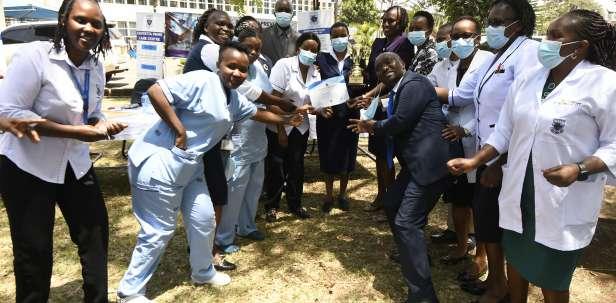
What is the history of the IPC department in the hospital?
The IPC department at KNH was set up in 1974 by a team of nurses and doctors offering IPC services in the hospital. The department grew over the years to have nurses and doctors covering all medical, surgical and critical care wards within the hospital. Having been fully set up in 2012, the department currently comprises a team of 8 coordinators in charge of ensuring IPC standards
and policies are met in all the wards within the hospital. The department was first headed by the current CEO, Dr Evanson Kamuri, as the Head of Unit.
What is the relevance of this year’s theme IPC week to the department?
The IPC Week was established by WHO in 1986 with the aim of highlighting what IPC is all about and the roles of IPC practitioners and other health care workers in saving lives from any transmissive diseases. The theme this year ‘The Future is Infection Prevention:50 years of Infection Prevention’ highlights the fact that Infection Prevention has been key in ensuring safe healthcare practices are met. Hospital Acquired Infections (HAIs) have proven to be a significant cause of mobility and mortality in most countries hence the need to create awareness on simple matters such as hand hygiene.
What are some of the strides made by the IPC department over the years?
We are one of the few hospitals that have an established IPC program with all the 4 pillars of the program in place, that is administrative support, engineering and environmental control, protective control and training research and surveillance. We also work with other departments such as Public Health, Microbiology to ensure that we meet the target of reducing Hospital Acquired Infections (H.A.I). Part of our mandate is also to do H.A.I surveillance and research
which then informs our policies and interventions in the unit to help us know which areas are doing well and which areas need intervention.
What is one highlight in your period as the head of IPC?
We have made huge strides in matters of hand hygiene where we are able to train our staff on its importance, then conduct hand hygiene audits and award different units that have outstanding performances. This year’s winners in maintaining Hand Hygiene Adherence were Ward 9C (CCU), Ward 4A AND Burns Unit respectively with Dental Unit being the most improved.The Hand hygiene challenge of awarding the top performers, motivated other Wards to work even harder.
Highlight some of the challenges you experience in the IPC department?
We still struggle with low adherence to hand hygiene and other IPC practices by our health care workers mostly attributed to the high patient numbers to care givers ratio. We however encourage them and enhance capacity building through training them to ensure they are well equipped.
Your parting shot?
I believe that no patient should contract an infection while receiving care. This can be achieved through adherence to IPC standards and building capacity. We encourage all our healthcare providers that we each have a role to play in minimizing HAIs because it begins with us, indeed the Future is
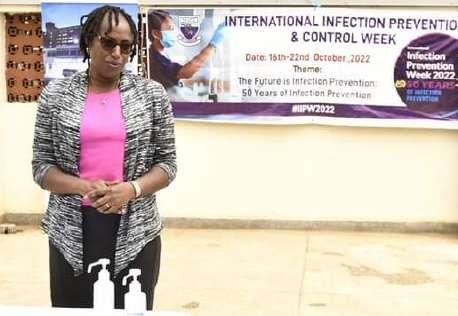
21/10/2022 ISSUE 22 | Kenyatta National Hospital Newsline We Listen, We Care 17
PHOTO | NICHOLAS WAMALWA
Dr.Rossaline Kinuthia HoU IPC KNH giving a speech at Mama Margaret Uhuru Hospital during staff sensitization on IPC matters
PHOTO | NICHOLAS WAMALWA
Dr. Rosaline Kinuthia Head of Unit-Infection Prevention and Control awards KPPC 9C Critical Care Unit (CCU) a certificate for winning this year’s IPC trophy after being named the best performing Unit in Hand Hygine Adherence in line with IPC procedures
KNH sharpens staff skills in CBRN management
Prevention of Terrorism Act, 2012, NACOSTI-National Commission for Science, Technology and Innovation among others).
The course provided in-depth training to participants on chemical agents, characteristic, symptoms and effects, which provides a great foundation for decision-making and response in the face of a CBRN crisis.
By Edel Q. Mwende
In the wake of catastrophes that occur in our ever-changing world, it is vital for individuals and institutions to be ready to respond appropriately.
The level 6 National Referral Hospitals have critical ingredients that can be used to prepare weapons of mass destruction (CBRN) for example the reagents in laboratories, KEPI cold chains for vaccines, Radiation departments, Academic and research departments, oncology for Cancer Treatment Centers and chemical agents used for sterilization (chlorine). The hospitals also have a large group of unprofiled medical students who may be used by terror group as insiders to get access of the hospital and reagents to pose a risk of being attacked. These institutions may receive casualties from disaster sites who are either contaminated by CBRN materials which again may course contamination of all hospital and human resources leading to a lockdown of the facility.
Kenyatta National Hospital, being at the apex of health care in the country has therefore introduced “KNH Basic Course on emergency response to Chemical, Biological, Radiological and Nuclear (CBRN) incidents for health workers.”
The course is available at the new KNH Training and Research Centre with the first cohort receiving intense five (5)-day class-based training (October 17th to 24th, 2022). The cohort comprised forty-one (41) staff from various clinical and nonclinical departments in KNH.
Spearheaded by the KNH Disaster Management Unit in collaboration with the National Disaster Management Unit (NDMU) and the Government Chemist Department, the training is geared at building the capacity of health workers to respond to CBRN exposures and provide the best patient care for exposed patients and themselves.
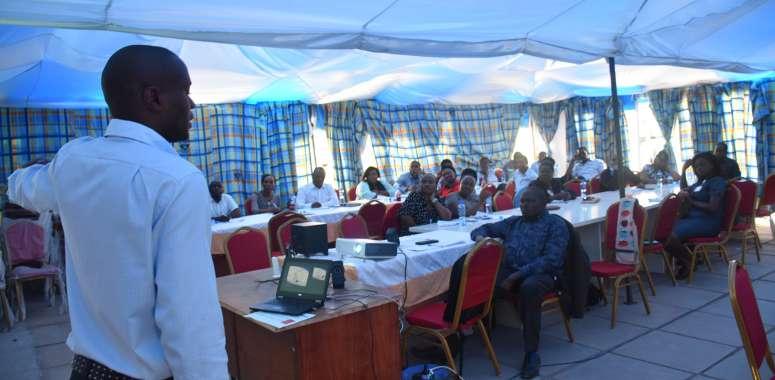
“The ten (10) modular training program helps participants recognize and respond swiftly to CBRN incidences and makes use of various case studies, interactive table-top exercises, timed online quizzes, practical group exercises, simulations and presentations in order to build adequate knowledge for effective response,” said Ms. Poline Njue, CBRN champion and Assistant Chief Nurse.
NDMU trainer and CBRN expert, Mr. David Makan emphasized on the importance of the four (4) strategies for the prevention of intentional CBRN disasters: “We have to Prepare, Protect, Prevent and Pursue.”
The Government Chemist Department trainer and CBRN expert, Mr. Douglas Keter enlightened the cohort on the international and national efforts in countering CBRN threats such as through the UN Security Council Resolution 1540, Chemical Weapons Convention (CWC), Biological Weapons Convention (BWC), Biological Weapons and Toxins Convention (BWTC), Nuclear Proliferation Treaty (NPT), Multilateral Export Control Regimes (MECRs) and the Kenyan efforts in countering CBRN Proliferation (such as through
In addition, the training covered biological agents such as anthrax, viruses and biotoxins that if released may cause harm or disasters, their classification, types, symptoms and how to handle in order to reduce or avoid fatalities. “Biological agents, if used as warfare agents have the most effect on humans, their environment and the economy,” said Mr. Makan.
“Radioactive agents are common in a hospital for use in clinical examination, however, if left unattended, they may emit radiations which may be catastrophic,” added Mr. Makan. He took the participants through a comprehensive review of the types of radioactive agents, symptoms and their prevention, factors and principles for radiation protection (time, distance and shielding).
The training also highlighted on Nuclear agents, their characteristics and effect. Furthermore, the participants were trained on the CBRN Incident Command System, principles of CBRN Medical Incident Management (safety and cordons) and safety triggers for emergency personnel plus (Evacuate, Communicate and advise, Disrobe, Decontaminate).
Other modules covered include CBRN detection, CBRN sampling, decontamination, ICT use in CBRN medical response and casualty management.
CBRN accreditation
Certificates will be awarded by Head of Government Chemist Department (National Authority for implementation of Chemical Weapon Convention and the focal point for CBRN matters in Kenya).
The staff appreciate the KNH management for making this great stride in supporting the CBRN course inception and delivery.
21/10/2022 ISSUE 22 | Kenyatta National Hospital Newsline We Listen, We Care 18
PHOTO | STEVE ARWA KNH staff receive CBRN training at the knh training and research centre
Breast Cancer Awareness
Signs, symptoms and prevention of Breast Cancer
feels different.
What are the vital signs to look out for?
Be on the lookout for a lump/ swelling in or around the breast, upper chest or armpit. Take notice of puckering or dimpling of the breast which mostly associates with inflammatory breast cancer. Change in colour of the breast, at times it may look red or inflamed.

Also, you may notice nipple change. For example, it may appear inverted (pulled inwards). A rash or crusting around the nipple may be visible. In the same vein, this can lead to changes in the size or shape of the breast. Finally, unusual discharge from either nipple is also a common sign of early signs of breast cancer.
By Petterson Njogu
October is universally observed as breast cancer awareness month, an annual campaign that raises awareness about the impact of breast cancer. Every October, people across the world come together to show support for everyone affected by breast cancer.
Additionally, in a global effort to raise awareness of breast cancer, this month has been designated as the pink month by the World Health Organization (WHO), where efforts to educate those concerned about the disease, including early identification and signs and symptoms associated with breast cancer.

Newsline interviewed Dr. Marilynn Omondi, breast consultant at KNH Prime Care Centre for an interview in an attempt to shed some light on signs and symptoms related to breast cancer and some preventative measures to put in place in an effort to keep the disease at bay.
What are the major signs associated with breast cancer?
It is always advisable to go for regular medical checkups since sometimes the breasts’ lump is often painless. But also, have what we call breast selfexamination which is easy to carry out even at home. They include; touching your breasts and feeling anything different or unusual, looking for changes and keenly observing whether something
Treatment and prevention measures
Once a patient comes to us after the above-suspected signs we order a mammogram, then we review and analyze the results. Once diagnosed with the disease, the treatment could be surgical where procedures such as lymph node dissection, mammaplasty, and mastectomy among others are effected. Medically, chemotherapy and radiotherapy is deployed to manage breast cancer.
It is important to note that men also get breast cancer. It is not that common but that does not mean they are immune to the disease and exhibit the same signs and systems as women do.
The best prevention to breast cancer is detecting it early and starting to manage it soonest. Also leading an active lifestyle, being of the required weight and eating healthy foods can also play a role in preventing breast cancer. At the KNH Prime Care Centre Corporate Outpatient Clinic, free breast self-examination education is available daily from 8a.m. to 5 p.m.
21/10/2022 ISSUE 22 | Kenyatta National Hospital Newsline We Listen, We Care 19
By Edel Q. Mwende
Comic Zone
Laughter, the best medicine!!

A doctor at anesthesia
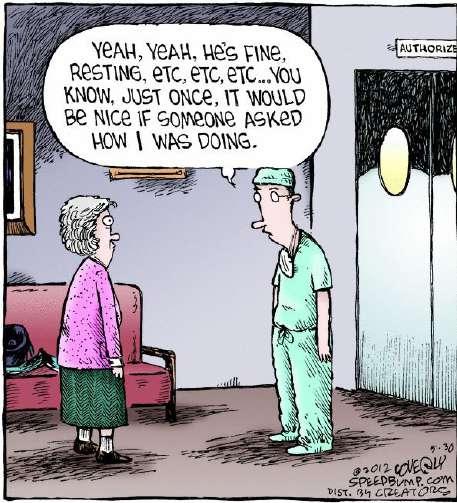

A doctor was just waking up from anesthesia after surgery, and his wife was sitting by his side. His eyes fluttered open and he said, “You’re beautiful!” and then he fell asleep again. His wife had never heard him say that so she stayed by his side.
A couple of minutes later, his eyes fluttered open and he said, “You’re cute!” Well, the wife was disappointed because instead of “beautiful,” it was “cute.” She asked, “What happened to ‘beautiful’?” His reply was “The drugs are wearing off!
A sea cadet is being examined:
“Suppose you’re at sea and a storm comes up, what would you do?”
Cadet: I’d throw out an anchor.
Examiner: And what if another storm comes up.
Cadet: I’d throw out another anchor.
Examiner: But what if an even bigger storm comes up?
Cadet: I throw out an even bigger anchor.
Examiner: But where are you getting all your anchors from?
Cadet: The same place you’re getting your storms.
OUR VISION
A world class patient-centered specialized care hospital
OUR MISSION

OUR MOTTO We Listen, We Care
Inspirational Quotes
1. Success is not an accident, success is a choice. -Stephen Curry
2. “Keep your face to the sunshine and you can never see the shadow.” - Helen Keller

3. Work hard now. Don’t wait. If you work hard enough, you’ll be given what you deserve.- Shaquille O’Neal
4. “Go as far as you can see; when you get there, you’ll be able to see further.” -Thomas Carlyle
5. “Your talent determines what you can do. Your motivation determines how much you’re willing to do. Your attitude determines how well you do it.” -Lou Holtz
6. “Light tomorrow with today.” -Elizabeth Barrett Browning
7. “Life is not easy for any of us. But what of that? We must have perseverance and above all confidence in ourselves. We must believe that we are gifted for something and that this thing must be attained.”Marie Curie
8. “Your time is limited, so don’t waste it living someone else’s life. Don’t be trapped by dogma - which is living with the results of other people’s thinking. Don’t let the noise of others’ opinions drown out your own inner voice. And most important, have the courage to follow your heart and intuition.” - Steve Jobs
9. “The question isn’t who’s going to let me; it’s who’s going to stop me.” - Ayn Rand
10. “Be fearless in the pursuit of what sets your soul on fire.” - Unknown
21/10/2022 ISSUE 22 | Kenyatta National Hospital Newsline We Listen, We Care 20
To optimize patient experience through innovative healthcare; facilitate training and research; and participate in national health policy formulation
ISO 15189 ACCREDITED ✓















 By Luke Kung’u
By Luke Kung’u




 By Cynthia Cherono
By Cynthia Cherono













 By Luke Kung’u
By Luke Kung’u










